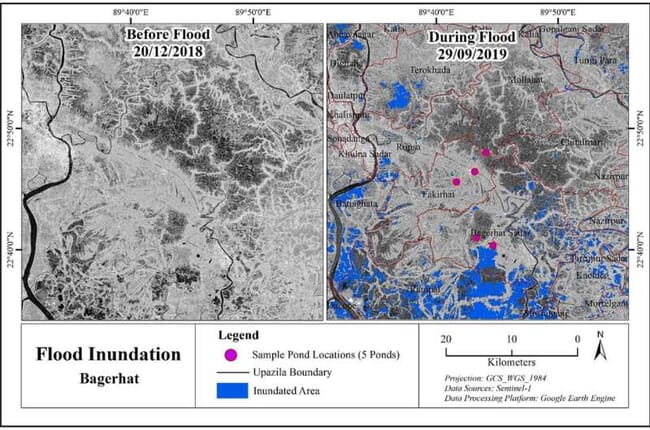
© Climate Risk Management (2023)
Bangladesh is highly vulnerable to extreme weather events which are predicted to increase in the near and distant future, according to a new study published in Climate Risk Management.
It said effective climate information services could help fish farmers reduce aquaculture losses caused by such events.
Greatest risks
Flooding appears to be the most financially damaging and regularly occurring hazard for hatcheries, as well as open water fish and shrimp farms, the study said.
Between 2011 and 2020, floods resulted in the estimated loss of about 49,000 tonnes of aquaculture production, valued at $93 million.
Cyclones were the second most damaging, causing the loss of 11,000 tonnes of fish products, worth a total of $24.8 million.
"Climate information services are a potential climate-risk reduction approach that could de-risk the aquaculture sector by supporting fish farmers' climate resilient decision-making and production management processes," the authors of the study said.
These services provide climate data that can support adaptation, mitigation, and risk management decisions.
Striving for global equity
According to the analysis, countries in the global South have tended to be slow in developing climate services for aquaculture, due to lack of awareness about their economic benefits and the focus of such tools on crops.
Peerzadi Rumana Hossain, WorldFish scientist and lead author of the study, said implementation of climate services in aquaculture depended on support from policymakers.
"We have already worked with the Bangladesh Department of Fisheries on developing a few propositions for policy level inclusion," Hossain stated in a press release.
She also said climate information generated by the Bangladesh Meteorological Department could be conveyed via the fisheries department to help the sector produce advisories and manage climate risks.
"There is also a need for involvement and investment from private sectors for the sustainability of the digital platforms for providing climate information and advisory services to all value chain actors of aquatic food systems in the country to enhance climate services at scale," added Hossain.
More than 91 percent of global aquaculture production (93.3 million tonnes in 2017) is currently produced in Asia, with Bangladesh ranking fifth globally after China, Indonesia, India and Vietnam.
Fish and fish-based foods supply 60 percent of the total daily animal protein intake for Bangladesh's population, significantly contributing to nutrition and food security for the vulnerable and marginalised people of the country.
Aquaculture and fisheries contribute nearly 26 percent to the agricultural gross domestic product of Bangladesh, the study says.
Knowledge is power
However, fish farmers are increasingly impacted by climate-driven extreme weather events, while data on climate variability - such as erratic rain, heat waves and cold spells - in aquaculture are scarce in the country. This makes it challenging to evaluate climate risk management interventions, the analysts say.
Hossain recalled how she and her co-researchers witnessed the loss of fish in a hatchery operation in south-western Bangladesh due to high temperatures and dry spells.
She said the fish farmer told researchers that if he had known there would be no rain in June and temperatures would be that high (36°C–40°C), he could have scheduled the fingerling stocking period earlier or later.
Sudhir Kumar Das, professor of fisheries resource management at West Bengal University of Animal and Fishery Sciences, said that fisheries policy should focus on promoting fisheries and aquaculture to achieve the UN Sustainable Development Goals.
As Prof Das stated: "Appropriate management of fisheries resources with emphasis on conservation of threatened fish as well as environment and social considerations need to be promoted in fisheries."




